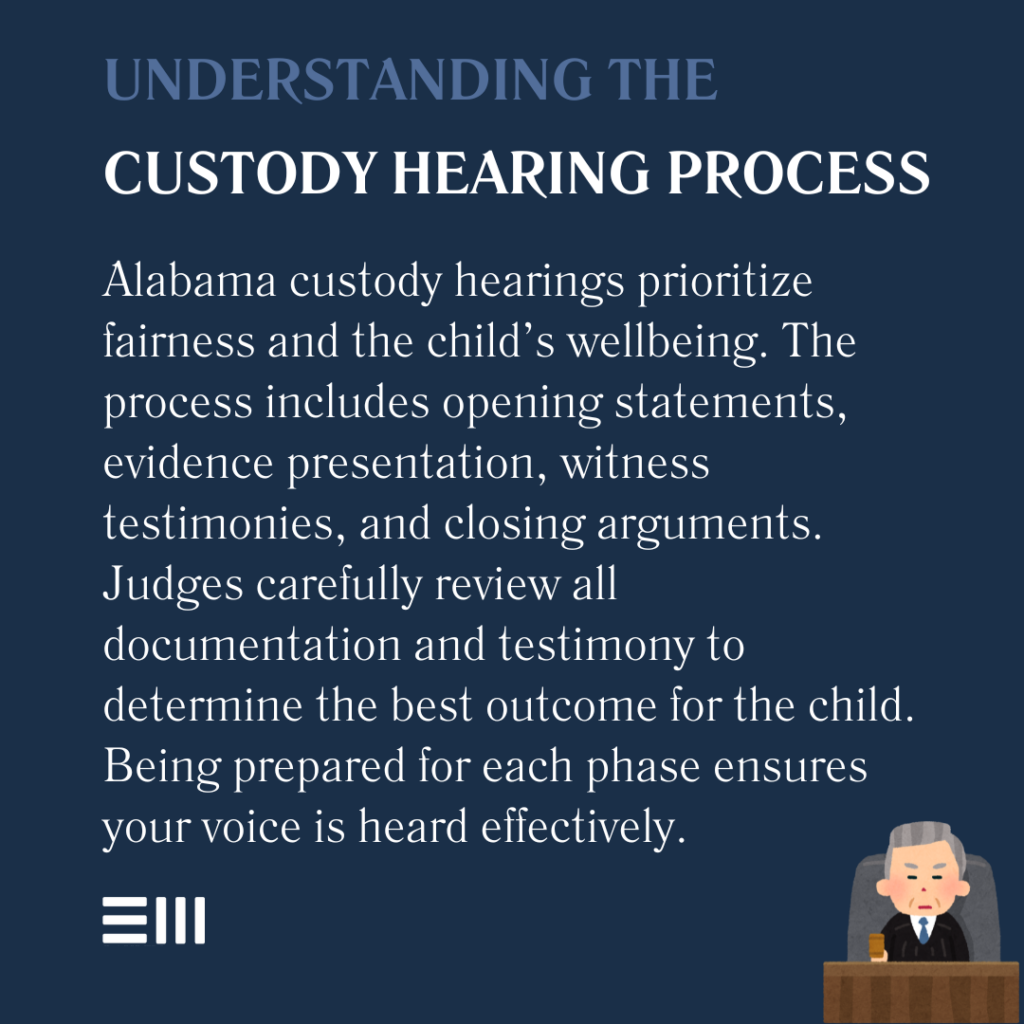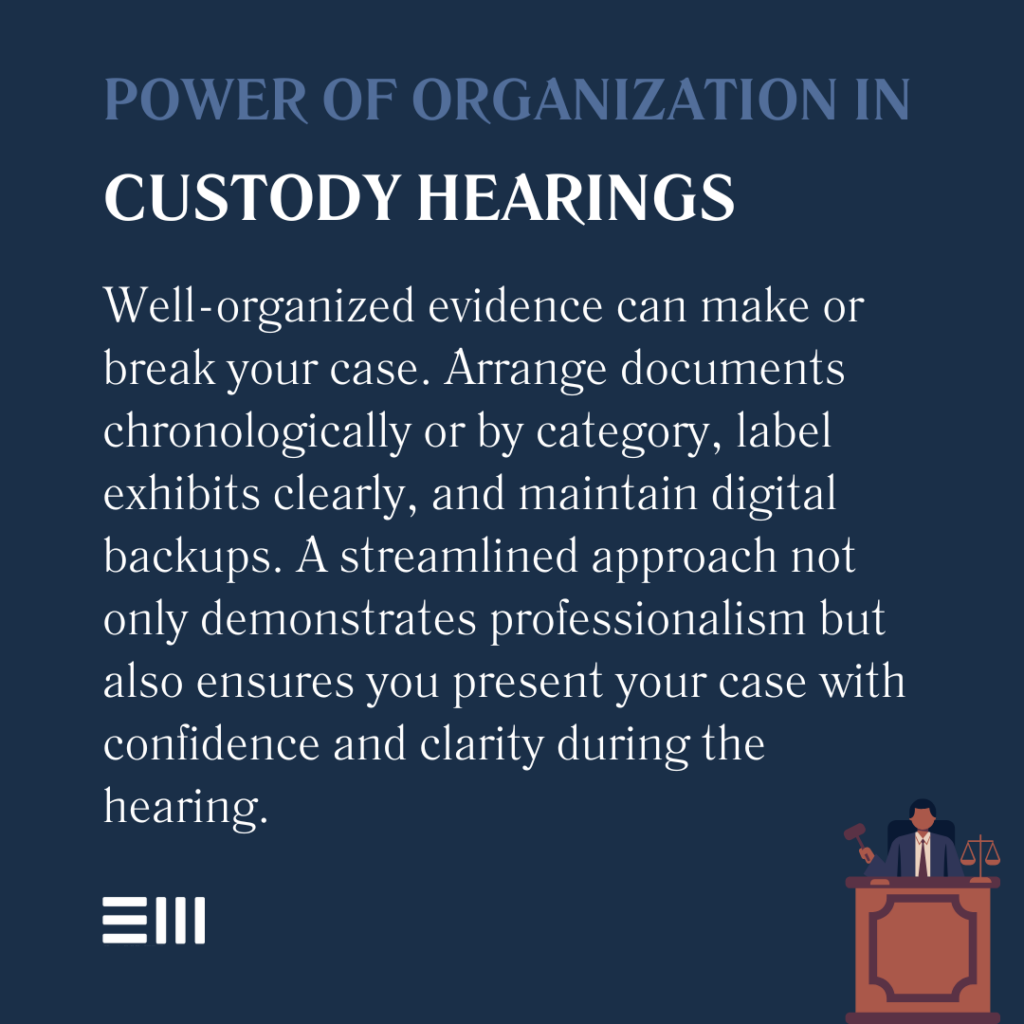
The judge’s gavel echoes through the courtroom, marking moments that will shape your child’s future.
In Alabama courtrooms, parents present their stories, share their hopes, and sometimes fight their fears—all while trying to prove they can provide the best life for their children during their child custody hearing.
While the hearing itself may last only hours, its impact resonates through years of bedtime stories, birthday celebrations, and everyday moments.
Timeline and Scheduling
Understanding the timing and scheduling of custody hearings helps you prepare effectively and manage expectations. Every step in the process requires attention to specific deadlines and requirements.
Important timeline considerations include:
- Filing deadlines for motions and responses;
- Discovery period requirements and deadlines;
- Mediation scheduling, if required;
- Guardian ad litem appointments and meetings;
- Expert witness availability coordination;
- Court calendar considerations;
- Hearing date notification requirements;
- Witness scheduling coordination;
- Document submission deadlines;
- Pre-trial conference timing;
- Emergency hearing procedures; and
- Continuance request protocols.
Proper timeline management ensures complete preparation for your hearing. Working backward from hearing dates helps organize preparation effectively.
Understanding the Hearing Process
Alabama custody hearings follow specific procedures designed to give each parent fair consideration while prioritizing children’s well-being.
Knowing what to expect helps you prepare effectively and present your case with confidence.
Key elements of custody hearings include:
- Opening statements from both parties;
- Presentation of evidence and documentation;
- Witness testimony and cross-examination;
- Expert witness presentations if applicable;
- Parent testimony opportunities;
- Closing arguments;
- Judge’s questions and considerations;
- Temporary or final order issuance;
- Procedural motions and objections;
- Evidence admission processes;
- Rebuttal opportunities; and
- Court reporter documentation.
Understanding these components helps you prepare appropriately for each phase. Every element requires specific preparation and attention to detail.

Essential Documentation
Proper documentation strengthens your position and demonstrates your commitment to your children’s wellbeing. Organizing these materials well before the hearing ensures you present a complete picture of your parenting capability.
Important documents to gather include:
- Work schedule and income verification;
- Children’s school records and report cards;
- Medical and dental records;
- Childcare arrangements and records;
- Housing information and photographs;
- Character reference letters;
- Communication records with the other parent;
- Children’s activity schedules and involvement;
- Financial records and budget plans;
- Police reports or protective orders if relevant;
- Counseling or therapy records;
- Documentation of special needs or requirements;
- Tax returns and financial statements;
- Insurance coverage documentation;
- Property ownership records; and
- Vehicle registration and insurance.
Thorough documentation preparation supports your position effectively. Organized presentation of these materials strengthens your case significantly.
Evidence Organization Strategies
Proper organization of evidence ensures efficient presentation and demonstrates preparedness. Strategic organization helps you access needed information quickly during the hearing.
Effective organization methods include:
- Chronological file arrangement;
- Category-based organization;
- Digital backup systems;
- Evidence log creation;
- Exhibit labeling systems;
- Document indexing;
- Cross-referencing systems;
- Timeline development;
- Witness correlation;
- Electronic presentation preparation;
- Duplicate copy management; and
- Quick-reference summaries.
Professional organization demonstrates competence and reliability. Well-organized evidence supports stronger case presentation.

Witness Preparation
Witnesses can provide valuable testimony supporting your parenting abilities. Selecting and preparing appropriate witnesses helps ensure their testimony effectively supports your case.
Potential witnesses may include:
- Family members who observe your parenting;
- Teachers or school administrators;
- Healthcare providers;
- Childcare providers;
- Neighbors or community members;
- Religious or spiritual leaders;
- Coaches or activity instructors;
- Mental health professionals;
- Child development experts;
- Character witnesses;
- Parenting class instructors;
- Social workers or counselors;
- Financial advisors or accountants;
- Property managers or landlords;
- Business associates or employers; and
- Community organization leaders.
Proper witness preparation ensures effective testimony delivery. Each witness should understand their role in supporting your case.
Personal Presentation and Conduct
Your behavior and presentation during the hearing significantly impact the court’s perception. Professional demeanor demonstrates respect for the process and commitment to your children’s well-being.
Important considerations include:
- Professional and conservative dress;
- Respectful courtroom behavior;
- Controlled emotional responses;
- Clear and honest communication;
- Active listening when others speak;
- Appropriate interaction with court staff;
- Punctuality and preparedness;
- Organized presentation of materials;
- Respectful treatment of opposing counsel;
- Focused attention throughout proceedings;
- Note-taking as needed;
- Proper forms of address for court officials;
- Body language awareness;
- Facial expression control;
- Personal grooming standards; and
- Electronic device management.
Professional conduct strengthens your position significantly. Every aspect of your presentation matters to the court’s evaluation.
Communication Strategies
Effective communication during your Alabama child custody hearing helps present your case clearly and demonstrates your co-parenting capabilities. Well-planned communication strategies support positive outcomes.
Key communication elements include:
- Clear and concise responses to questions;
- Focused discussion of children’s needs;
- Respectful references to the other parent;
- Emotional control during difficult topics;
- Specific examples of parenting situations;
- Demonstration of co-parenting willingness;
- Honest acknowledgment of challenges;
- Solutions-focused discussion;
- Child-centered perspective;
- Active listening skills;
- Appropriate non-verbal communication;
- Professional tone maintenance;
- Clarity in responses;
- Truthful answer provision;
- Question understanding confirmation; and
- Response preparation strategies.
Effective communication supports your position positively. Practice these skills before the hearing for better results.
Understanding Legal Standards
Alabama courts apply specific standards when making custody decisions. Understanding these standards helps you present relevant information effectively.
Important legal considerations include:
- Best interests of the child standard;
- Age and developmental needs;
- Parent-child relationships;
- Home environment stability;
- Educational opportunities;
- Healthcare access and quality;
- Extended family relationships;
- Community connections;
- Religious considerations;
- Cultural factors;
- Special needs accommodations;
- Safety considerations;
- Moral fitness evaluation;
- Financial stability assessment;
- Geographic proximity impact; and
- Historical caregiver role.
Knowledge of legal standards guides effective case presentation. Focus on factors the court considers most relevant.
Parenting Plan Development
A well-developed parenting plan demonstrates your commitment to your children’s well-being. Thoughtful planning shows the court you’ve considered all aspects of your children’s needs.
Essential plan elements include:
- Regular visitation schedules;
- Holiday and special occasion arrangements;
- Education decision-making processes;
- Healthcare management procedures;
- Religious upbringing agreements;
- Extra-curricular activity participation;
- Communication methods between parents;
- Transportation arrangements;
- Emergency protocols;
- Expense sharing;
- Decision-making authority;
- Conflict resolution procedures;
- Technology use guidelines;
- Travel permission processes;
- Relocation consideration; and
- Schedule modification procedures.
Comprehensive planning demonstrates parental capability effectively. Each element should prioritize children’s needs and stability.
Managing Stress and Emotions
Custody hearings can be emotionally challenging. Developing strategies to manage stress and emotions helps maintain composure and present your best case.
Helpful management techniques include:
- Professional counseling support;
- Stress reduction practices;
- Exercise and physical activity;
- Adequate rest and nutrition;
- Support system utilization;
- Meditation or relaxation techniques;
- Time management strategies;
- Preparation thoroughness;
- Regular breaks during preparation;
- Emotional support access;
- Healthy coping mechanisms; and
- Professional guidance seeking.
Emotional stability supports effective hearing participation. Proper self-care ensures better performance during proceedings.
Post-Hearing Procedures
Understanding post-hearing procedures helps prepare for next steps and ensure compliance with court orders. Proper follow-through demonstrates responsibility and commitment.
Important considerations include:
- Order implementation timing;
- Required documentation submission;
- Payment arrangement establishment;
- Schedule coordination methods;
- Communication protocol implementation;
- Record-keeping systems;
- Modification request processes;
- Appeal rights understanding;
- Compliance documentation;
- Support payment arrangements;
- Insurance coordination; and
- School notification procedures.
Proper post-hearing management ensures smooth transition implementation. Professional guidance helps navigate these requirements effectively.
Frequently Asked Questions About Alabama Child Custody Hearings
Parents often have questions about Alabama child custody hearing preparation.
Here are answers to common concerns that arise before Alabama custody hearings.
What Should I Wear to Court?
Dress professionally and conservatively, as if attending an important business meeting. Your appearance shows respect for the court process.
How Long Will the Hearing Last?
Hearing length varies based on case complexity but typically ranges from several hours to multiple days for complicated cases.
Can My Child Testify at the Hearing?
While possible, courts carefully consider children’s age and maturity before allowing testimony, often preferring private judge interviews instead.
What if the Other Parent Makes False Accusations?
Maintain composure and respond with documented facts rather than emotional reactions. Evidence typically outweighs unsupported claims.
How Should I Address the Judge?
Always address the judge as “Your Honor” and stand when speaking unless instructed otherwise.
What Happens if I Need to Reschedule?
Contact your attorney immediately to file a continuance request, providing valid reasons for the scheduling change.
Can I Bring Support People to Court?
Yes, but they must maintain appropriate courtroom behavior and may be asked to wait outside during proceedings.
Build Your Strongest Case Today
Your children’s future deserves the strongest possible representation. Our experienced family law attorneys can help you prepare thoroughly for your Alabama custody hearing.
Contact us for a confidential consultation about your case.
Can't find what you're looking for? Search our site below.










